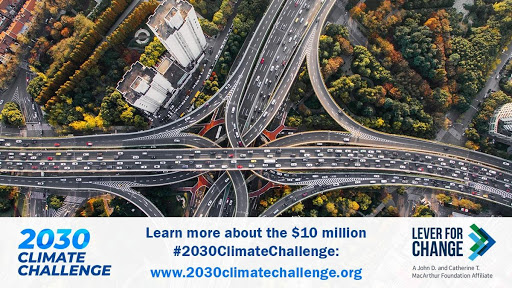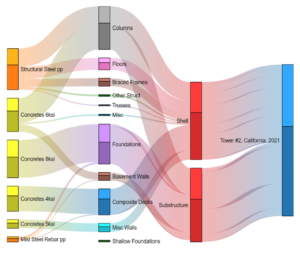Carbon Leadership Forum among Finalists Selected for $10 Million 2030 Climate Challenge
Grant Will Focus on Reducing Greenhouse Gas Emissions in the U.S. by 2030
 SEATTLE, February 9, 2021 – Today, Lever for Change announced that the Carbon Leadership Forum (CLF) and four other finalist teams will advance to the next stage of the 2030 Climate Challenge, a $10 million award launched last year to reduce greenhouse gas emissions in the U.S. by 2030. The Challenge, sponsored by an anonymous donor, will fund proven, data-driven solutions tackling greenhouse gas emissions in the buildings, industry, and/or transportation sectors in communities across the country.
SEATTLE, February 9, 2021 – Today, Lever for Change announced that the Carbon Leadership Forum (CLF) and four other finalist teams will advance to the next stage of the 2030 Climate Challenge, a $10 million award launched last year to reduce greenhouse gas emissions in the U.S. by 2030. The Challenge, sponsored by an anonymous donor, will fund proven, data-driven solutions tackling greenhouse gas emissions in the buildings, industry, and/or transportation sectors in communities across the country.
“While the world is rolling out a rapid response to the coronavirus pandemic, there is no vaccine for climate change,” said Cecilia Conrad, CEO of Lever for Change. “The global nature of this threat requires a similar sense of urgency and commitment to significantly reducing our greenhouse gas emissions.”
Sixty-eight proposals for the 2030 Climate Challenge were evaluated during a three-month process that included peer reviews, as well as a final review by an expert panel of more than 45 philanthropic and civic leaders, and climate experts. Applications were evaluated based on four criteria: whether they were impactful, feasible, scalable, and durable.
Over the next few months, the finalists will work with a team of technical experts to strengthen, revise, and re-submit their proposed solutions for the $10 million award.
Building with Biomass: Using Buildings to Sequester Carbon at Gigaton-Scale: The Carbon Leadership Forum at the University of Washington, in partnership with Endeavour Center, University of Colorado Boulder, and Building Transparency, proposes to convert buildings to carbon sinks by storing carbon in buildings using biogenic materials and reducing carbon emissions in all other building materials.
“The Carbon Leadership Forum is accelerating the transformation of the building sector to rapidly reduce the carbon emissions associated with building materials and construction through collective action,” said founder and Executive Director, professor and chair of the department of Architecture, Kate Simonen. “Science-based targets tell us that global emissions must reduce by over 50% in the next decade. Novel carbon- storing buildings materials made of plants are available on the market today, however their carbon benefits are not uniformly valued and they face significant barriers to adoption at scale. We need to energize, inform and empower diverse communities who make, buy and use building materials to propel rapid innovation and adoption of carbon smart materials. We are thrilled to be considered for this grant which can take us one step further towards making buildings a true solution to climate change.”
The Challenge is being managed by Lever for Change, a nonprofit that helps donors to find and fund solutions to the world’s greatest challenges, including racial and gender equity, economic development, and the future of refugees.
A final grant recipient will be announced in the summer of 2021. Learn more about the 2030 Climate Challenge and the five outstanding finalists: www.2030climatechallenge.org.
Engineering News-Record 2019 Top 25 Newsmakers
Kate Simonen: Climate Activist Rallied Industry to Reduce Embodied Carbon
Featured Press Release:
Breakthrough tool launched at Greenbuild empowers users to radically reduce embodied carbon in buildings and infrastructure

The Embodied Carbon in Construction Calculator (“EC3”) tool delivers the first digitized EPDs for construction materials in a free platform designed to accelerate early adoption across the entire construction industry.
Georgia World Congress Center, ATLANTA – November 19, 2019 – The Embodied Carbon in Construction Calculator (EC3) tool launched in public beta version at Greenbuild today, giving the building industry a powerful means to take action on an area of growing concern: embodied carbon emissions of building materials.
This free, open-access tool, based on the industry’s first database of digitized Environmental Product Declarations (EPDs), will allow architects, engineers, owners, construction companies, building material suppliers and policy makers users to easily evaluate and reduce embodied carbon emissions from construction materials, effectively empowering them to reduce embodied carbon within buildings at scale. …more »
CLF & Partner News
Decarbonizing construction
WBSCD’s report “Decarbonizing construction – Guidance for investors and developers to reduce embodied carbon” provides targeted guidance for...
Wisconsin Girl Scouts Educate an Industry
Troops 1477 and 1952 Produce Educational Video on Embodied Carbon in Concreteby Julia PoolerLeader of Girl Scout Troop 1477 and 1952, Madison,...
1 – Embodied Carbon 101
This resource aims to provide a high-level overview of embodied carbon -- how it is defined, its significance in the global climate crisis, and why...
Embodied Carbon: A Clearer View of Carbon Emissions
International engineering firm Walter P Moore has released a groundbreaking stewardship report entitled Embodied Carbon, A Clearer View of Carbon...
EC Education Video Playlist
This playlist from CLF's Youtube channel is a compilation of webinars and presentations created by members, contributors, and staff of the Carbon...